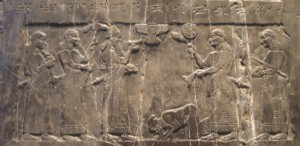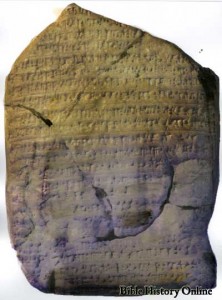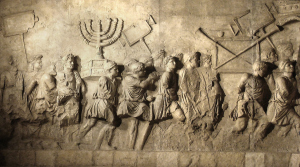PALESTINIANS: THE INVENTED PEOPLE
by Y.K. Cherson and Rachel Molschky

Assyrians found no "Palestinians." (Photo: http://oracc.museum.upenn.edu/)
"The history of the Palestinian people goes back as far as"... This is where Arab "historians" disagree. Some say the "Palestinian people" have a proud 4000-year history; others say 10,000 years, 30,000 years, and even —don't laugh&151;200,000 years, which makes the Neanderthals pretty young people compared to the "mysterious Palestinians". But although Arab historians do not agree on the "insignificant" details like the age of the "Palestinian people", they do agree that this people is incredibly ancient &151;far more ancient than Jews, Romans or Greeks.
In the glorious history of the "Palestinian people", there is only one "small" problem; nobody in history ever found them.
In 721 BCE, Assyria conquered the Kingdom of Israel. This is a historical fact nobody denies. Of course, the "Palestinian people" heroically fought against the aggressors and caused them heavy losses? Well, not exactly. Not a single Assyrian Chronicle, not even a single clay tablet, mentions this noble people. Could it be that hundreds of thousands of "Palestinians" were heroically fighting the Assyrian invaders — and these invaders did not even notice it? At the same time, those same Assyrian Chronicles are full of reports about the battles with the Israelis. So, Assyrians very well found Israelis, but did not notice any "Palestinians"?

Well, Assyrians did not notice any "Palestinian people". Most probably, because the King Sargon II was a Zionist. And what about Babylonians? The same mystery awaits us when we start reading the Babylonian Chronicles about the conquest of the Kingdom of Judah between 597 and 582 BCE. Jews are there at every second page. And "Palestinians"? There is not a word about them. Babylonians did not find them, either.
But of course Persians found "Palestinians" and left to us the detailed description of this wonderful people, of its rich culture, interesting habits, language...? Alas. They did not. The Persian Chronicles are telling us about Jews, about how Cyrus granted them the permission to return to Jerusalem, about how Persian satraps ruled in Judah and Israel... But about the "Palestinians" — not a word.
What makes the "quest to find Palestinians" even more amusing is that Alexander the Great passed all along the coast of Palestine from Tyre to Gaza in 332 — but did not find a single "Palestinian": only Jews.
Where the heck did the "Palestinians" hide?
Well, ok, Assyrians, Babylonians, Persians, even Alexander the Great: it was so long ago! But what about the scrupulous and methodical Romans? The same story.
Romans explain in great detail how they were besieging Jerusalem, scrupulously informing us about how Jews were desperately defending it. They describe the Jewish revolts and how they quelled them and provide information about how Jews were fighting against them in Masada, about how Romans divided Judah and renamed it Palestine, about how they renamed Jerusalem in Aelia Capitolina...They tell us about a lot of things — but they do not say a single word about some "Palestinians".
Moreover, although they renamed the land in "Palestine", they went on calling its inhabitants as they were called for thousands of years: Jews. So, "Palestine" became the official name of the land, but its inhabitants remained Jews.
Just a moment, and where were the "Palestinian people" when Arabs came?
It's a million dollar question. Modern Arabs say they are "Palestinians". And what did the Arabs of the 7th century, those who conquered Palestine, say about this?
Do you know any document written in the period of the Arab rule in Palestine that would say a word about some "Palestinians"? I do not. And nobody does, because such a document does not exist.
The situation becomes really amusing! Arabs today are foaming about how their forefathers lived in Palestine since the Time Immemorial, and their forefathers did not have any idea about their glorious and ancient past there.
Well, after all, the Arab rule in Palestine did not last long. Just 300 years after the Arab conquest, Turks —first Mamluks and then Ottomans &151; threw them out. Under various names — Seljuks, Mamluks, Ottomans &151; the Turks ruled in Palestine for 600 years. Quite enough time to find such a numerous and glorious ethnic group as the "Palestinian people". Did the Turks find them? Alas! The Turkish official statistics accurately puts the number of Jews, Arabs, Circassians and Bosnians in Palestine, providing detailed information about the number of Muslims, Christians and Jews — yet they never mention any "Palestinian people".

Even the Romans who renamed the land "Palestine" found no "Palestinians."
Ok. Assyrians, Babylonians, Greeks, Romans, Persians and Arabs did not happen to notice any "Palestinian people". Turks, in those 600 years they ruled in Palestine, did not find them either. And where was this incredibly ancient and unbelievingly heroic people hiding after 1917? The numerous League of Nations Commissions (later UN Commissions) did not find them; all the League of Nations documents of that period are only about Jews and Arabs, but there is not a word about any "Palestinians" as a separate people. Maybe the politicians of the Western countries talked about "Palestinians" then? No, they did not. Delegates from 11 nations went to the area and found what had long been apparent: two conflicting groups, Arabs and Jews, whose national aspirations could not be reconciled. "Palestinians"? Who are they?
But the politicians of the Arab counties, of course... Alas. The politicians of the Arab countries were very clear on this subject.
"We consider Palestine as part of Arab Syria, as it has never been separated from it at any time. We are connected with it by national, religious, linguistic, natural, economic and geographical bonds." (First Congress of Muslim-Christian Associations, February 1919)
The representative of the Arab Higher Committee to the United Nations submitted a statement to the General Assembly in May 1947 that said, "Palestine was part of the Province of Syria," and that, "politically, the Arabs of Palestine were not independent in the sense of forming a separate political entity."
In 1937, a local Arab leader, Auni Bey Abdul-Hadi, told the Peel Commission, which ultimately suggested the partition of Palestine: "There is no such country as Palestine! 'Palestine' is a term the Zionists invented! There is no Palestine in the Bible. Our country was for centuries part of Syria."
"Palestine and Transjordan are one." — King Abdullah, Arab League meeting in Cairo,12 April 1948
So the Arabs in the 1940s did not notice any "Palestinians". Moreover, they did not "notice" any "Palestine" either!
Ok. In the 40s, the Arab politicians did not find any "Palestinian people". It's no surprise; nobody could find them.
But maybe they "found" this mysterious "Palestinian people" later? They did not.
Syrian President Hafez Assad addressing the Palestinian leader, the Chairman of the Palestine Liberation Organization (PLO), President of the Palestinian National Authority (PNA) and "Father of the Palestinian People" Yasser Arafat, explained to him:
"You do not represent Palestine as much as we do. Never forget this one point: There is no such thing as a Palestinian people, there is no Palestinian entity, there is only Syria. You are an integral part of the Syrian people, Palestine is an integral part of Syria. Therefore it is we, the Syrian authorities, who are the true representatives of the Palestinian people."
Of course, the Palestinian leader, "Father of the Palestinian People" and so on, rejected these insinuations with indignation and... Actually, no, he did not.

"Our nation is the Arabic nation that stretches from the Atlantic Ocean to the Red Sea and beyond it..." — Yasser Arafat. (Photo Source: http://www.familysecuritymatters.org/)
Moreover, Arafat himself made a definitive and unequivocal statement along the same lines as late as 1993, when he declared that, "The question of borders doesn't interest us... From the Arab standpoint, we mustn't talk about borders. Palestine is nothing but a drop in an enormous ocean. Our nation is the Arabic nation that stretches from the Atlantic Ocean to the Red Sea and beyond it...The P.L.O. is fighting Israel in the name of Pan-Arabism. What you call "Jordan" is nothing more than Palestine."
Not long ago, Azmi Bishara (the ex-Knesset member exiled from Israel for passing sensitive information to Hezbollah during the Second Lebanon War) who is anything except Israel's friend, said the same: there is no Palestinian people. You can see and hear his words for yourselves, here is the link.
"The truth is that Jordan is Palestine and Palestine is Jordan." — King Hussein of Jordan, in 1981
"Palestine is Jordan and Jordan is Palestine; there is only one land, with one history and one and the same fate," — Prince Hassan of the Jordanian National Assembly was quoted as saying on February 2, 1970.
Abdul Hamid Sharif, Prime Minister of Jordan declared in 1980, "The Palestinians and Jordanians do not belong to different nationalities. They hold the same Jordanian passports, are Arabs and have the same Jordanian culture."
But the Arabs who lived in Palestine since, as they assure us, the Time Immemorial, of course did not let Syrian and Jordanian dictators deprive them of their proud Palestinian past? You will be surprised, but they let them. And they had very serious reasons for this.
Do you know
That until 1950, the name of the Jerusalem Post was THE PALESTINE POST?That the journal of the Zionist Organization of America was NEW PALESTINE?That the Bank Leumi's original name was the ANGLO-PALESTINE BANK?That the Israel Electric Company's original name was the PALESTINE ELECTRIC COMPANY?That there was the PALESTINE FOUNDATION FUND and the PALESTINE PHILHARMONIC?And all these were JEWISH ORGANIZATIONS, organized and run by JEWS.In America, the Anthem of the Zionist youngsters sang "PALESTINE, MY PALESTINE", "PALESTINE SCOUT SONG" and "PALESTINE SPRING SONG".
Until the late 60s, to call an Arab a "Palestinian" would mean to insult him because until the late 60s, the word "Palestinian" was commonly and unanimously associated in all the world with Jews, and all the world knew: Palestine is just another name for Israel and Judah, like for example Kemet was just another ancient name for Egypt. Arabs who lived in Palestine identified themselves as Arabs and were insulted when someone called them "Palestinians": we are not Jews, we are Arabs, they used to respond.
Let's Set Things Straight
There is a country in the Far East. The people who live there, (and they have lived in this country for many centuries), poetically called it "The Land Of The Rising Sun". Then the Western travelers and geographers came to this country and gave it another name. Why? Maybe they were not poets, or maybe they came there on the sunset, or maybe they could not pronounce the original name in the original language... Did the people who lived there change because Western travelers and then politicians and journalists started to call their country by another name? No. They were those same people and they went on calling their country "The Land Of The Rising Sun".
And the West calls it Japan.
There is a country in the Middle East. The people who lived there for many centuries called it "Eretz Israel" - The Land of Israel. Then the people from the West came - and gave to it another name. Did the people who lived there change? No. They were those same people and they went on calling their country "The Land of Israel".
And the West calls it Palestine.
ADDENDUM
So if the Palestinians weren't in Palestine in ancient times, when did they come? They came in waves -- not to their homeland, but first as invaders and later looking for economic opportunity. The majority are newcomers. This next is from "Are Palestinians the Indigenous People of Palestine?" by Dr Rivka Shpak Lissak. The full article is archived at http://chersonandmolschky.com/2014/02/09/spotlight-palestinians-indigenous-people-palestine/.
THE ARABS CAME IN FOUR WAVES:
First Wave (7TH Century)
The first wave was after the occupation of the country by the Arabs in the 7th century A.D. The Arab — Muslim occupation of Palestine lasted about 400 years (640 — 1099). Most scholars agree that the ethnic-religious structure of the population remained essentially unchanged from the days of the Byzantine occupation (324CE — 640CE), and the majority of the population consisted of Greek Orthodox Christians and 2 minorities: Jews and Samaritans. The number of Arabs settled in Palestine was negligible.
The Muslim army emerging from the Arabian Peninsula was comprised of Bedouin warriors who moved along with their families and flocks. Prof Moshe Sharon, rejects the theory that the 7th century Arabic conquest was immediately accompanied by massive Arabic settlement in the country. He gives several reasons for the absence of massive Arabic penetration into the Land of Israel prior to the 9th century...
... An Arabic 9th century source attests to the composition of the coastal cities population, which included Jews, Samaritans, Persians, Greeks, and a few Arabs.
At a later stage, soldiers released from the Caliph's Muslim army settled in villages and towns that had been deserted by Christians fleeing ahead of the Arab conquerors, but no numerical data is available.
In summary, Umayyad rulers' policies did not emphasize Arabic settlement in the country nor the conversion of its population, but rather acculturation, the introduction of the Arabic language and culture while protecting the local population against Bedouin raids that harmed farming. Islamization policies were hardly enforced with only a few exceptions, as during the time of the Caliph Omar II (717-720). Acculturation (Arabization) advanced faster than Islamization. No significant change in the population composition took place and the population remained mostly Christian, with Jewish and Samaritan minorities.
Second Wave (Middle of the 10th Century — 11th Century)
The second wave came from the middle of the 10th century until the occupation of the country by the Crusaders in 1099. During these years Beduins (Arab nomad tribes) from the deserts of Arabia, Trans-jordan, Syrian desert, Sinai and Egypt invaded the country and gradually settled in deserted villages after they robbed and have driven out the local peasants, many of them Jews. Still, the country was settled along religious- ethnic lines with small enclaves: The north of the Shomron mountain became Arabic, but the south and the Jerusalem area was Christian, and so was the western Galilee. The eastern Galilee was Jewish and the Cities along the shore were mixed, with a Christian majority.
The Population during Crusaders' Rule (1099 —1260)
The Crusaders massacred during the conquest of the country many Muslims and many others ran away. During the Crusaders rule the Northern part of the country, the Galliee, was settled by Christians in the west and Jews in the east with some Arabic enclaves. The mountains of Samaria were settled by Arabs and Samaritans, but the mountains of Judea and around Jerusalem was mostly Christian, with some Arabic enclaves. The Southern part of the country was mostly settled by Bedouins, who were nomads.
In short, out of 470,000 people who lived in the Holy Land the Christians were the largest religious group — about 320,000: about 200,000 were of Syrian-Aramaic (non- Arabs) origin and about 120,000 were Crusaders.
The Population during Mamluks' Rule (1260 — 1516)
The Mamluks conquered most of the country from the Crusaders in 1260. They destroyed the cities along the shores of the Mediterranean Sea between 1260 — 1290. These cities were populated mostly by Christians of Syrian — Aramaic origin. Many were massacred or ran away before the Mameluk army arrived...
... The rate of Palestine's population decreased dramatically because of massacres, emigration of Christians, the Black Death, and the economic situation. A certain amount of Christians were forced to convert to Islam.
The Population during Ottomans' Rule (1516 — 1918)
... The population at the end of the 16th century grew to 206, 290, and the country remained mostly uncultivated and densely populated.
The Third Wave (16th — 17th Century)
... the economic situation and the lack of personal security caused people to leave, Muslims included. During the 17th- 18th centuries the population became smaller and smaller. Tourists from Europe and the United States who visited the country described an uncultivated deserted land.
The Fourth Wave, Part One (1832 — 1917)
The last and the largest wave came between around the middle- end of the 19th century and 1948 when Israel was established. This wave started during the conquest of the country by the son of Muhammad Ali between 1832 1840.Egypt settled along the shore and the valleys, about 100,000 Egyptian peasants. Also, Arabs and Muslims were invited by the Ottoman rulers to settle in the deserted country. The Zuabbian tribe was invited in 1873 from Irbid, Trans-Jordan to settle in the southern Galilee and the Izrael Valley. Muslims from Muslim countries such as Kurds and Circassians settled in the north.
Historians are divided on the size of the population on the eve of the British conquest of Palestine. The views range from 100,000 to 400,000, but most think the rate of the Arab-Muslim population was about 250,000.
The Fourth Wave, Part Two (1917 — 1948)
The second part of the largest wave came during the British Mandate occupation, between 1917 and 1948 when Israel was established. Arabs and Muslims from Arabic and Muslim countries entered illegally the country under the Turks and latter the British mandate from the eastern, northern and southern borders looking for jobs created by the Zionist movement and latter by the British Mandate (1918 — 1948). The Arab population of the Sharon area (between Tel Aviv and Haifa, the center of Jewish settlements) grew from 10,000 to more than 30,000 from 1922 — 1940s. The Arab population of the south (between Jaffa and the Egyptian border) grew by more than 200% between 1917 — 1940s. About 35,000 Arabs from the Haurain, South Syria came looking for work.
From 1870 to 1948 the Arabic population grew by 270%. Even in Egypt, the Arab country with the highest birth rate, the rate was only 105%, which proves that a significant part of the Arabic population growth came from immigration. By 1921 when the British government performed its first census the number of Arabs and Muslims amounted to about 500,000. The 1931 British Census included about 30 different languages spoken by the Muslim population in Palestine. They were illegal immigrant workers from Arabic and Muslim countries. The high rate of children's deaths, law life expectancy and the lack of health services in the country made it impossible to reach 270% as a result of birth rate.
In Short, from about 250,000 around the end of the 19th century, many of them bedouins, the Arabic population grew to about 1,250,000 in 1948. The Palestinian claim that they are the ancient population of the so called Palestine has no ground.
Winston Churchill, said in May 22, 1939 that the Arab immigration to Palestine during the British Mandate was so large that their numbers grew in such proportion that even if all Jews immigrated to Palestine they could not reach that number...
Y.K.Cherson is an Israeli writer who has written countless articles for sites like Right Side News, Ali Sina's Faith Freedom and many more. He has spent a lifetime serving the public. With an extensive military career which provided invaluable experience dealing firsthand with terrorists and future terrorists, his current "day job" keeps him on the front lines of the immigration and related crime issues facing us today. A graduate of Moscow State University and Tel Aviv University, Cherson has a Ph.D. in International Politics and Economics. Aside from his military and academic background, his unique perspective comes from a lifetime of living around the world: first in Eastern Europe, then the Middle East, and currently in the West.
Rachel Molschky is the editor and administrator of the Cherson and Molschky website. A graduate of Syracuse University (as mentioned in "Terrorist Attack on Pan Am Flight 103: 25 Years Later") and with a background in journalism, as well as business writing and research, Molschky has joined forces with Cherson to inform the public of what the mainstream media fails to report, with the main focus being the three "I's": immigration, Islam and Israel.
This article appeared on the Cherson and Molschky website and is archived at
http://chersonandmolschky.com/2014/01/09/palestinians-invented-people/.
Rachel Molschky is the editor and administrator of the Cherson and Molschky website. A graduate of Syracuse University (as mentioned in "Terrorist Attack on Pan Am Flight 103: 25 Years Later") and with a background in journalism, as well as business writing and research, Molschky has joined forces with Cherson to inform the public of what the mainstream media fails to report, with the main focus being the three "I's": immigration, Islam and Israel.
This article appeared on the Cherson and Molschky website and is archived at
http://chersonandmolschky.com/2014/01/09/palestinians-invented-people/.
(PLO executive committee member Zahir Muhsein, in a 1977
ReplyDeleteinterview with the Dutch newspaper Trouw.)
"The Palestinian people does not exist. The creation of a
Palestinian state is only a means for continuing our struggle
against the state of Israel for our Arab unity. In reality
today there is no difference between Jordanians,
Palestinians, Syrians and Lebanese. Only for political and
tactical reasons do we speak today about the existence of
a Palestinian people, since Arab national interests demand
that we posit the existence of a distinct 'Palestinian
people' to oppose Zionism.
"For tactical reasons, Jordan, which is a sovereign state
with defined borders, cannot raise claims to Haifa and Jaffa.
While as a Palestinian, I can undoubtedly demand Haifa,
Jaffa, Beer-Sheva and Jerusalem. However, the moment we
reclaim our right to all of Palestine, we will not wait even a minute to unite Palestine and Jordan."